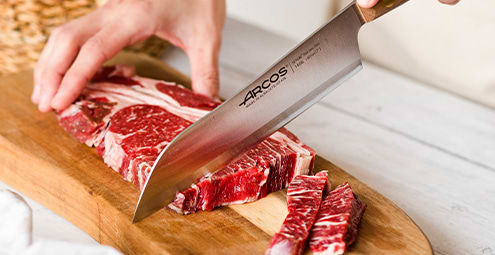How knives affect the flavor of food
If you’re a travel and food lover like us, you’ve probably noticed that in certain countries, including India and Morocco, people still eat with their hands—something unthinkable today in the West.
However, recent studies have shown that the utensils we use to eat—our classic spoon, fork, and knife—can significantly change the way we experience the taste of food. Curious, isn’t it? To clear up any doubts, we sat down with our knife experts so they could explain how the sharpness, blade material, and cutting technique can impact each of our culinary preparations. Keep reading, because what we’re about to share will truly surprise you.
How do knives influence the flavor of food?
The knife is one of the essential tools in our kitchen, but we rarely stop to consider how its use can influence the flavor of our food or culinary creations. The truth is that the way an ingredient is cut can alter both its texture and the release of its juices, and therefore its actual flavor.
Cutting food affects much more than just its appearance; it also impacts its chemical and organoleptic composition. Using an inappropriate knife can crush, tear, or even cause the premature oxidation of certain ingredients, which ultimately alters both their taste and freshness.
To make this easier to understand, imagine cutting an onion with a knife that isn’t properly sharpened—you’ll break the cells of the vegetable in an irregular way, releasing more sulfur compounds that intensify its flavor and aroma. If you do the same task with a well-sharpened knife, you’ll cut the onion cleanly, minimizing the release of these compounds and achieving a much more balanced flavor.
The impact of the knife’s sharpness
Using a well-sharpened knife can make a big difference when cooking at home, as it allows you to make more precise and clean cuts, which helps maintain the structure of each of your foods. When using knives, it’s important to keep certain aspects in mind, specifically:
-
Precise cuts result in less cellular damage to food: dull knives tear food instead of cutting it, which alters its texture and leads to the loss of essential juices from the food itself.
-
Less oxidation: when cutting fruits and vegetables with a sharp knife, you tend to reduce the exposure of the surface to oxidizing agents. This allows you to maintain both their color and freshness for much longer.
-
Better presentation and a much more defined flavor: ingredients cut uniformly cook much more evenly, which improves your overall dining experience.
The blade material and its influence on flavor
Just like the sharpness of the knife, the material from which the knife itself is made also plays an essential role in preserving the flavor of food. It has been proven that certain materials can react with some ingredients, which directly affects their taste and quality.
Stainless steel does not react with food. It is much more resistant and easy to maintain, making it the ideal material for general use in your kitchen. If you take a quick look at your cooking utensils, you’ll probably find that more than a few are made from this material.
If you have carbon steel knives, you should know that this material does react with acidic foods, such as tomatoes or citrus fruits, which can alter their flavor. With use, you’ll also notice that the blade darkens over time. In conclusion, try to get rid of this type of knife and opt for options made from stainless steel or ceramic knives. These are other alternatives for your kitchen that do not transfer flavors or odors.
Specific cuts to enhance flavor
Did you know that some foods release specific compounds when they are cut? Thanks to this, you can enhance or alter their flavor. The technique and type of knife you choose can make a real difference in the final result of each of your dishes.
- When cutting meat and fish, try to make very clean cuts and always follow the direction of the fibers.
- To maintain the intense flavor of onions and garlic, we recommend making very small cuts.
- Use very well-sharpened knives when cutting fresh herbs.


Can we prevent our knives from contaminating flavors?
Great question! The truth is yes, there are very simple ways to prevent our knives from affecting the original smell and flavor of food. From using different knives depending on the type of food you’re going to cut, to thoroughly cleaning the blade after each use, or storing them in places where you know they won’t rust or absorb odors.
Now that you know all this, it’s time to put all our tips and tricks into practice to make sure each of your foods maintains its flavor 100%.

